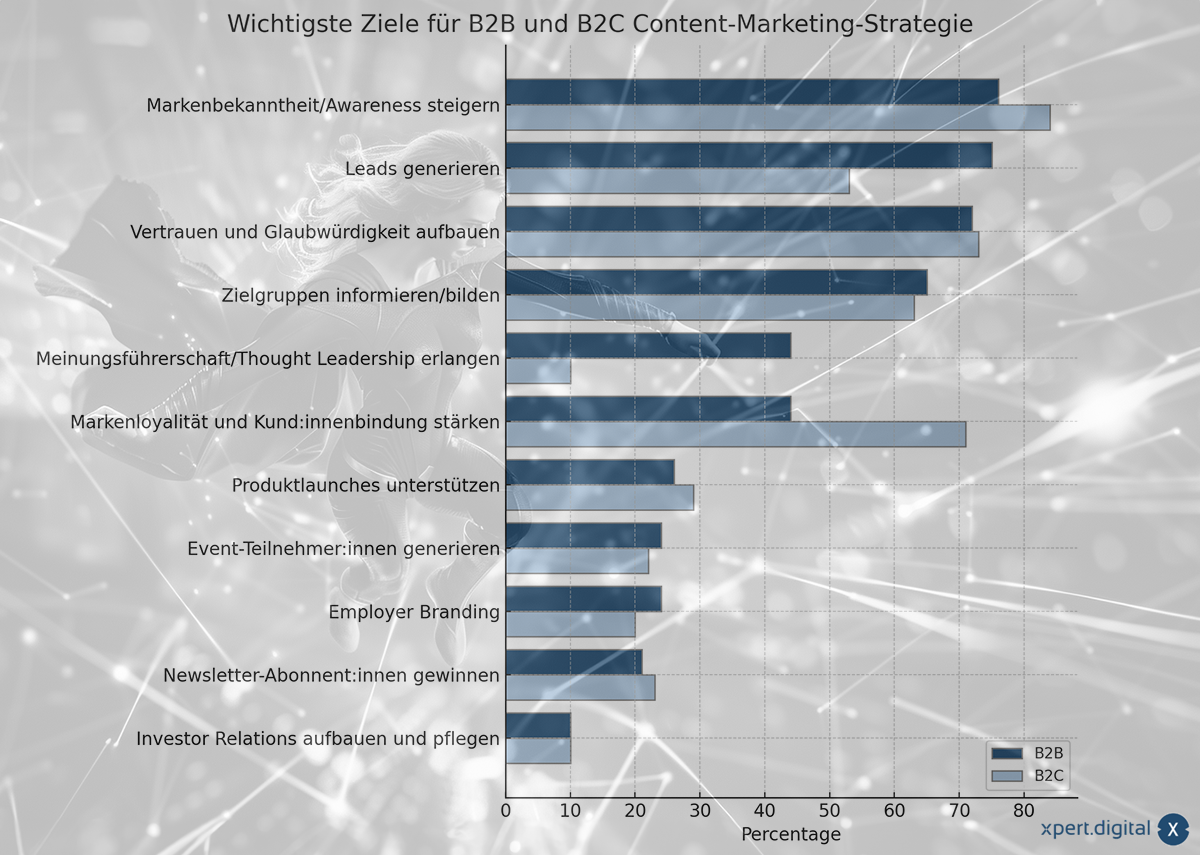Most important goals for B2B and B2C in the content marketing strategy: increasing brand awareness, awareness and visibility
Language selection 📢
Published on: August 17, 2024 / Update from: August 17, 2024 - Author: Konrad Wolfenstein

Most important goals for B2B and B2C in the content marketing strategy: increasing brand awareness, awareness and visibility - Image: Xpert.Digital
📈 Content marketing: An essential part of modern marketing strategies
📚 Content marketing is an essential element in modern marketing strategy for both B2B and B2C companies. It offers companies the opportunity to effectively reach their target groups, build brand awareness and maintain long-term customer relationships. The use of content marketing aims to provide value to customers, create trust and ultimately achieve business goals. In this context, the question arises: What specific goals do companies pursue with their content marketing activities, and how do these differ between B2B and B2C markets?
🔍 Brand awareness and trust as primary goals
A key goal for both B2B and B2C companies is increasing brand awareness. In an increasingly digital world where customers have a wealth of information and brands to choose from, it is crucial that a brand is visible and stands out from the competition. Brand awareness not only helps reach potential customers, but is also the first step to building long-term trust.
However, for B2B companies, in addition to brand awareness, building trust and credibility is also a priority. In this market segment, purchasing decisions are often more complex and require longer sales cycles. It is therefore crucial that the target group perceives the brand as trustworthy and competent. Content marketing that provides relevant information and demonstrates expertise plays an essential role in earning this trust.
B2C companies, on the other hand, attach particular importance to strengthening brand loyalty and customer loyalty in addition to brand awareness. In markets where competition is fierce and customers can easily switch to competitors, it is important to attract and retain loyal customers. By tailoring content that meets customers' needs and interests, companies can build a stronger emotional connection with their brand.
🎯 Lead generation and target group building
Another key goal for many companies is generating leads. For B2B companies, this is critical because the success of sales teams often depends on obtaining high-quality leads that can be moved into the sales process. Content marketing can be an effective tool to attract potential customers and convert them into qualified leads by providing valuable and relevant information.
B2C companies are also increasingly recognizing the value of lead generation through content marketing. The aim here is often to identify potential customers at an early stage of the purchase decision process and to persuade them to make a purchase through targeted marketing measures. This can be achieved by offering exclusive content, discount promotions or by providing product information that convinces the customer of the brand and encourages them to buy.
In addition to lead generation, educating and informing the target group is another essential aspect of content marketing. It is particularly important for B2B companies to educate potential customers about the benefits of their products and services and help them make informed decisions. This not only increases trust, but also positions the company as an expert in its industry.
💡 Thought leadership and opinion leadership
Another goal that is particularly relevant for B2B companies is achieving opinion leadership, also known as “thought leadership”. In highly competitive markets, a company can establish itself as a thought leader by providing high-quality, informative and innovative content. This helps to position the company as a leading player in its industry in the eyes of the target group, which in turn strengthens trust in the brand.
For B2C companies, opinion leadership plays a less central role. Instead, the focus here is often on addressing customers emotionally in order to create strong brand loyalty. Through creative and appealing content, companies can attract the attention of their target group and anchor themselves in their everyday lives.
🚀 Challenges and opportunities in content marketing
Although the goals are clearly defined, companies also face significant challenges when it comes to content marketing. One of the biggest challenges is to continually produce high-quality, relevant content that resonates with the target audience. Especially in today's fast-moving digital world, companies must constantly innovate and adapt to changing market conditions.
Another obstacle is measuring the success of content marketing activities. While it can be easy to measure metrics like website visits or social media engagement, it's often more difficult to quantify the true impact of content marketing on sales or brand loyalty. Companies therefore need to develop effective methods to determine the ROI of their content marketing strategies.
Despite these challenges, content marketing offers numerous opportunities. With the right strategy, companies can not only strengthen their brand and expand their audience, but also build deeper relationships with their customers. This is especially important at a time when consumers are increasingly looking for authenticity and transparency.
📊 Pillar in marketing strategy
Content marketing remains a crucial pillar in the marketing strategy of both B2B and B2C companies. While the specific goals may vary, both market segments share the overarching goal of building trust, creating brand awareness, and nurturing long-term relationships with their target audience. With a well-thought-out and consistently implemented content marketing strategy, companies can strengthen their market position, achieve their business goals and survive successfully in an increasingly competitive world.
📣 Similar topics
- 📈 Increase brand awareness with content marketing
- 🔑 Build trust through high-quality content
- 🏢 B2B vs. B2C Marketing Goals: A Comparison
- 🎯 Lead generation for B2B companies
- 💡 Thought leadership as a competitive advantage
- ❤️ Strengthen customer loyalty in the B2C sector
- 📊 Measuring success in content marketing
- 🌟 Analyze challenges and opportunities
- 📚 Target group formation through informative content
- 🚀 Success strategies in content marketing
#️⃣ Hashtags: #ContentMarketing #BrandAwareness #LeadGeneration #CustomerRetention #ThoughtLeadership
Our recommendation: 🌍 Limitless reach 🔗 Networked 🌐 Multilingual 💪 Strong sales: 💡 Authentic with strategy 🚀 Innovation meets 🧠 Intuition
At a time when a company's digital presence determines its success, the challenge is how to make this presence authentic, individual and far-reaching. Xpert.Digital offers an innovative solution that positions itself as an intersection between an industry hub, a blog and a brand ambassador. It combines the advantages of communication and sales channels in a single platform and enables publication in 18 different languages. The cooperation with partner portals and the possibility of publishing articles on Google News and a press distribution list with around 8,000 journalists and readers maximize the reach and visibility of the content. This represents an essential factor in external sales & marketing (SMarketing).
More about it here:
🌐📈 Content marketing: B2B and B2C goals in comparison 📉💼
📊 Brand recognition and awareness as a central goal
The primary goal that both B2B and B2C companies pursue with their content marketing strategy is to increase brand recognition and awareness. In B2B, 76% of companies say this is their most important goal. For B2C companies, this proportion is even higher, at 84%. This underlines the importance of the brand as an essential component of marketing success. Strong brand recognition helps companies differentiate themselves in an increasingly competitive market environment. In the B2C sector, it is crucial to bring the brand directly into the minds of consumers to create an emotional connection and influence purchasing decisions. In the B2B sector, brand awareness is also crucial as it strengthens the trust of potential business partners and forms the basis for long-term business relationships.
🔒 Trust and credibility as the foundation of marketing success
In addition to increasing brand awareness, the focus is on building trust and credibility. In B2C, 73% of companies see this as one of their top goals, while in B2B it is 72%. Trust is a key element in the buying process. Consumers and businesses want to ensure they are working with a brand or business partner they can trust. B2C marketing is often about authentic communication and transparent practices that strengthen consumer trust. B2B companies, on the other hand, have to impress with their specialist knowledge and competence in order to be perceived as a trustworthy partner. Sound content marketing that creates added value through informative and valuable content is essential.
🕵️♂️ Lead generation as a central goal in B2B
Another important goal that is particularly emphasized in the B2B sector is lead generation. 75% of B2B companies say this is one of their top priorities. In comparison, only 53% of B2C companies consider this to be one of their most important goals. Lead generation is particularly important for B2B companies as they typically have longer and more complex sales cycles. Building a qualified lead database is an essential step to establishing long-term business relationships and driving sales growth. Content marketing offers the opportunity to reach potential customers with valuable information and tailored content and to accompany them on their decision-making journey.
📚 Target group information and education
The goal of informing and educating the target group is also very important, especially in the B2B sector, where 65% of companies consider this an essential goal. In the B2C sector, 63% of companies see this as important. Content marketing provides a platform to share knowledge, explain complex topics and educate the target audience. This is particularly relevant for B2B companies as their products or services often require technical or specialized information to support buyers' decision-making process. B2C companies, on the other hand, use content marketing to inform consumers about products, trends or lifestyles, which influences their brand loyalty and purchasing decisions.
💌 Brand loyalty and customer retention
Brand loyalty and customer retention are crucial factors in ensuring long-term success, especially in B2C, where 71% of companies see this as one of their top goals. In the B2B sector, this is important for 44% of companies. While brand awareness helps to attract new customers, customer loyalty ensures that they stay with you in the long term. Loyalty can be fostered through personalized content, exclusive offers and continuous delivery of value. In the B2B sector, the focus is on maintaining business relationships through regular communication and support.
💡 Thought leadership and opinion leadership
A differentiating goal in B2B marketing is achieving thought leadership, which 44% of companies strive for. In the B2C sector, this plays a significantly smaller role at only 10%. Thought leadership is crucial for B2B companies as it allows them to position themselves as a leading expert in their industry. By providing innovative ideas, research and deep insights into industry trends, companies can build trust and differentiate themselves from the competition.
🛒 Product launches and event participant acquisition
In B2C marketing, the focus is also on supporting product launches (29%) and attracting event participants (22%). These goals are often specific to launching new products or services and relevant to increasing brand presence at events. In the B2B sector, these goals play a minor role, as product development often takes longer and the event landscape is more geared towards professional conferences and trade fairs rather than large public events.
📢 Differences and similarities in content marketing goals
The differences and similarities in the content marketing goals of B2B and B2C companies show that content marketing is universally applicable, but needs to be targeted differently depending on the target group and business model. While B2C companies rely more on emotions and direct consumer communication, B2B companies focus on professional authority and long-term business relationships. However, both approaches underscore the overarching importance of brand awareness and building trust as the cornerstone of any successful content marketing strategy.
By adapting content marketing strategies to specific business goals and target groups, companies in both the B2B and B2C sectors can increase their competitiveness and achieve sustainable growth. A clear focus on the right priorities – be it brand awareness, lead generation or customer retention – allows companies to use their marketing resources efficiently and achieve measurable results.
📣 Similar topics
- 📣 Strengthen brand awareness: The basis of success
- 🤝 Focus on trust and credibility
- 🏆 Effective lead generation in B2B marketing
- 🎓 Target group information and education as key
- 💡 Thought leadership in B2B: More than just expertise
- 🌟 Promote brand loyalty through targeted content marketing
- 🚀 Successful product launches with content marketing
- 📅 Event participant acquisition through targeted content
- 📢 The universal importance of trust in marketing
- 💬 Individual content strategies for B2B and B2C
#️⃣ Hashtags: #BrandAwareness #Trust #LeadGeneration #TargetGroup Building #ThoughtLeadership
We are there for you - advice - planning - implementation - project management
☑️ SME support in strategy, consulting, planning and implementation
☑️ Creation or realignment of the digital strategy and digitalization
☑️ Expansion and optimization of international sales processes
☑️ Global & Digital B2B trading platforms
☑️ Pioneer Business Development
I would be happy to serve as your personal advisor.
You can contact me by filling out the contact form below or simply call me on +49 89 89 674 804 (Munich) .
I'm looking forward to our joint project.
Xpert.Digital - Konrad Wolfenstein
Xpert.Digital is a hub for industry with a focus on digitalization, mechanical engineering, logistics/intralogistics and photovoltaics.
With our 360° business development solution, we support well-known companies from new business to after sales.
Market intelligence, smarketing, marketing automation, content development, PR, mail campaigns, personalized social media and lead nurturing are part of our digital tools.
You can find out more at: www.xpert.digital - www.xpert.solar - www.xpert.plus
























